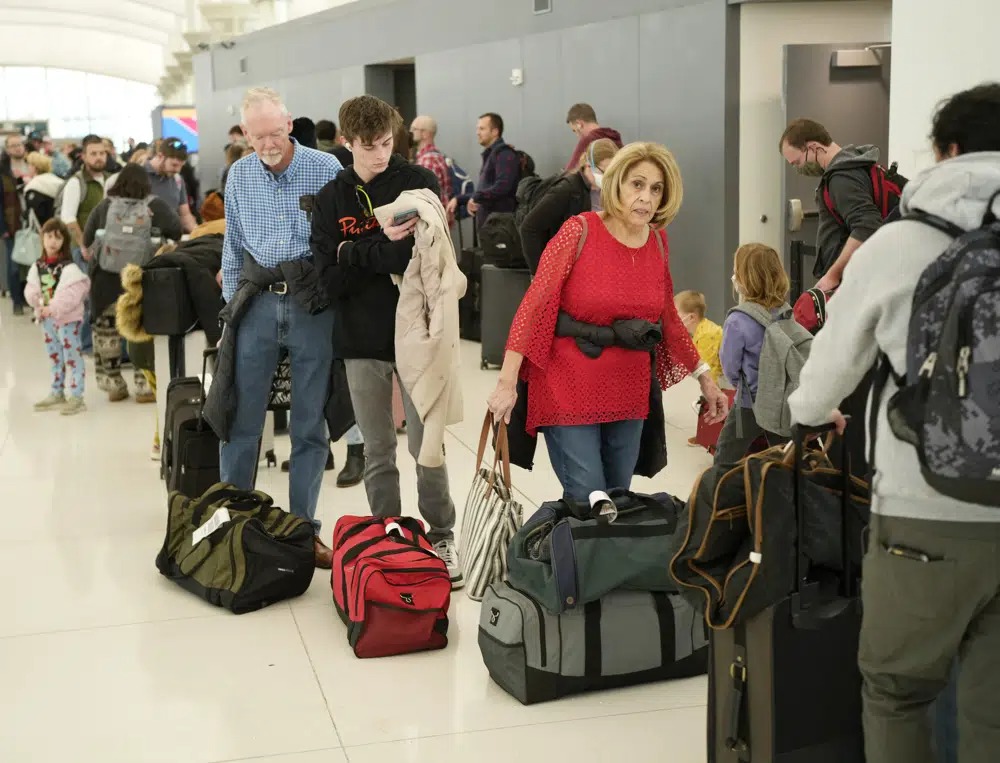Senators who want to impose tougher penalties when U.S. airlines strand or delay passengers say they finally might be able to turn their ideas into law because of outrage over debacles like the one at Southwest Airlines in December.
Democrats Richard Blumenthal of Connecticut and Edward Markey of Massachusetts said Tuesday they will again offer a “passenger bill of rights” that would, among other things, allow customers to file class-action lawsuits against airlines, and legislation to limit airline fees.
A trade group for the largest U.S. airlines issued a blistering attack on the legislation.
Both the passenger-rights and airline-fee proposals from longtime critics of the airline industry have floundered in the past, and they lack Republican support so far in the new Congress. But the lawmakers argue that they can succeed this time by attaching their ideas to must-pass legislation to reauthorize the Federal Aviation Administration.
Southwest canceled 16,700 flights in late December, likely affecting travel plans for about 2 million people, when it took more than a week to recover from a winter storm. Crew-scheduling technology — which got less attention from Southwest leaders than other technology spending — was overwhelmed, leaving planes, pilots and flight attendants out of position for days.
The U.S. Transportation Department is investigating the meltdown, which has made Southwest the butt of jokes on TV shows including “Saturday Night Live.”
The disaster will cost Southwest about $1.1 billion by the airline’s own reckoning, but the disruptions accounted for a small part of the 210,000 U.S. flights that airlines canceled in 2022. The rate of cancellations surged 52% from 2021.
“The airlines need to be given some incentives to do the right thing, and consumers need protection,” Blumenthal told reporters.
Southwest did not respond to a request for comment, but a spokeswoman for trade group Airlines for America said the industry is a highly competitive one that benefits consumers.
“This bill undermines and eliminates decades of successful policies that have transformed air travel, allowing the vast majority of Americans to take flight,” said the spokeswoman, Marli Collier. “The proposed policies in this bill — instituting government-controlled pricing, establishing a private right of action and dictating private sector contracts — would drastically decrease competition, leading to a subsequent increase in airfare prices and potential cut in services to small and rural communities.”
Blumenthal’s proposal would set $1,350 as the minimum compensation for passengers bumped off oversold flights. It would require airlines to provide alternate transportation and reimbursement of out-of-pocket costs to customers whose flights are delayed as briefly as one hour — Southwest says it is reimbursing stranded passengers for “reasonable” hotel and meal expenses.
The bill would also allow consumers to file class-action lawsuits and eliminate caps on fines the government can levy for airlines that violate consumer-protection laws.
“If Southwest faced these kinds of potential penalties and consumer class-action, it might have updated its IT systems,” he said.
Markey proposes separately to limit fees to what it costs the airline to provide the service.
Both proposals have failed to gain traction in previous years. Blumenthal said things are different now because of the increase in disruptions by airlines that received tens of billions of dollars in pandemic relief from taxpayers.
There is precedent for attaching passenger provisions to FAA reauthorization bills. The last one, in 2018, included a directive for the government to set minimum standards for airline seats, although there has been little progress on that front.
And airlines have prevailed in other fights. Also in 2018, they successfully lobbied Congress to drop a provision that would have let the government decide whether airline fees for things like checking bags and assigning seats are reasonable.
(AP)












One Response
Given the fact that disruptions are financially devastating to the airline (or manufactures), government penalties accomplish nothing. Consider how effective it is to sentence someone to an additional 20 years in prison, if he’s already serving a life sentence.